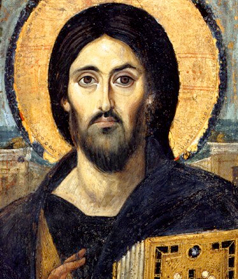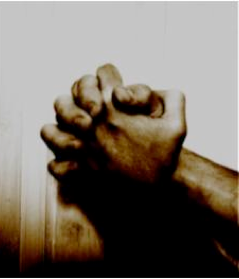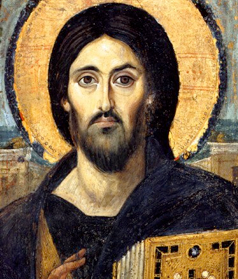|
|
|
|
Prayer
One of the most common of human spiritual practices is prayer. Prayer is found across the world in a variety of forms, and employs a wide variety of techniques and methods of articulation. At its heart, prayer is the formal or deliberate stating of an intention for oneself or for another person or groups of persons, or even for a situation. That is, a person desires that a certain thing will happen, or a particular state of being or set of circumstances be achieved, and they formulate that intention into words. This is the essence of prayer. In traditions such as Christianity, Islam, Judaism, the prayers are directed to God, who serves as the one who listens to and receives such stated intentions or prayers. But prayer is also found in Buddhism, Hinduism, Paganism and Wicca, and indigenous and traditional societies across the globe. It is a well-nigh universal human practice. What is unique in Christian prayer is how this practice is grounded in the life and teaching of Jesus Christ, and how it is often directed to him in a conversational manner, as if face-to-face. |
The Spiritual Disciplines of Jesus |
Richard Foster in his book Prayer, identifies at least 21 kinds of prayer in the Christian tradition alone. Foster groups these types of prayer into three basic directions: inward, upward and outward. Prayer engages the person praying in a process of personal transformation, which occurs within. But there is also the human need for intimacy, and especially intimacy with God. In the Christian tradition, God is a God of deep personal relationship, who goes in search of fellowship with human beings, even becoming like them in order to have an up close and personal relationship. Thus there is an upward movement to prayer. But prayer also moves the person praying out into the world. Even though prayer is usually private (Jesus urged his followers to pray in secret), the fact that prayer involves the naming of our intentions for one another and for the world, it has a strong social dimension to it as well.
The power of prayer arises from the fact that it is first and foremost an activity of the will of God. In his instructions on prayer to his disciples, Jesus gives them an example of how to pray. He said:
Significantly, Jesus begins the prayer by grounding it in the nature of God and God’s will. Prayer is a holy act, because God is holy. And because God is holy, prayer needs to be grounded in God’s will for the world. That is, our intentions, as voiced in our prayer, must be rooted firmly in God’s intentions. Christian teaching over the centuries has emphasized that Jesus came to reveal the will of God to humankind. Keeping that in mind, we can understand that by teaching his followers how to pray, Jesus was also teaching them that it is the will of God that we pray. The very act of praying manifests the will of God in a very concrete and specific way. The following is my definition of prayer, which expresses this notion: “Prayer is that part of the will of God that needs the vehicle of human expression in order to be manifested in the material world.”
Prayer is a way of attuning our wills to the greater Will that pervades the universe. The God who called all things into being and who upholds and sustains all things desires to be known by us, and prayer is that mechanism of knowing and being made known. Prayer is the cornerstone of the spiritual life. As in all avenues of human knowing of other persons, it is based in communication, conversation and dialog. It is also based in an honest opening of one’s heart and inner life to the other, in this case, to God. The Psalmist expresses it eloquently:
O LORD, you have searched me
and you know me.
You know when I sit and when I rise;
you perceive my thoughts from afar.
You discern my going out and my lying down;
you are familiar with all my ways.
Before a word is on my tongue
you know it completely, O LORD.
You hem me in—behind and before;
you have laid your hand upon me.
Such knowledge is too wonderful for me,
too lofty for me to attain.
Where can I go from your Spirit?
Where can I flee from your presence?
If I go up to the heavens, you are there;
if I make my bed in the depths, you are there.
If I rise on the wings of the dawn,
if I settle on the far side of the sea,
even there your hand will guide me,
your right hand will hold me fast.
If I say, "Surely the darkness will hide me
and the light become night around me,"
even the darkness will not be dark to you;
the night will shine like the day,
For you created my inmost being;
you knit me together in my mother's womb. (Psalm 139:1-13 NIV)
Prayer is, in essence, an act of radical intimacy with God. God is radically intimate with us in that we are entrusted with the task of acting as conduits for God’s work of blessing the world in acts of compassion, mercy, justice and love. We are radically intimate with God by opening ourselves to God’s guidance and to the shaping of our lives and characters by the Holy Spirit. There is no other way to be spiritually formed by God.
The power of prayer arises from the fact that it is first and foremost an activity of the will of God. In his instructions on prayer to his disciples, Jesus gives them an example of how to pray. He said:
- "This, then, is how you should pray: 'Our Father in heaven, hallowed be your name, your kingdom come, your will be done on earth as it is in heaven. Give us today our daily bread. Forgive us our debts, as we also have forgiven our debtors. And lead us not into temptation, but deliver us from the evil one” (Matthew 6:9-13).
Significantly, Jesus begins the prayer by grounding it in the nature of God and God’s will. Prayer is a holy act, because God is holy. And because God is holy, prayer needs to be grounded in God’s will for the world. That is, our intentions, as voiced in our prayer, must be rooted firmly in God’s intentions. Christian teaching over the centuries has emphasized that Jesus came to reveal the will of God to humankind. Keeping that in mind, we can understand that by teaching his followers how to pray, Jesus was also teaching them that it is the will of God that we pray. The very act of praying manifests the will of God in a very concrete and specific way. The following is my definition of prayer, which expresses this notion: “Prayer is that part of the will of God that needs the vehicle of human expression in order to be manifested in the material world.”
Prayer is a way of attuning our wills to the greater Will that pervades the universe. The God who called all things into being and who upholds and sustains all things desires to be known by us, and prayer is that mechanism of knowing and being made known. Prayer is the cornerstone of the spiritual life. As in all avenues of human knowing of other persons, it is based in communication, conversation and dialog. It is also based in an honest opening of one’s heart and inner life to the other, in this case, to God. The Psalmist expresses it eloquently:
O LORD, you have searched me
and you know me.
You know when I sit and when I rise;
you perceive my thoughts from afar.
You discern my going out and my lying down;
you are familiar with all my ways.
Before a word is on my tongue
you know it completely, O LORD.
You hem me in—behind and before;
you have laid your hand upon me.
Such knowledge is too wonderful for me,
too lofty for me to attain.
Where can I go from your Spirit?
Where can I flee from your presence?
If I go up to the heavens, you are there;
if I make my bed in the depths, you are there.
If I rise on the wings of the dawn,
if I settle on the far side of the sea,
even there your hand will guide me,
your right hand will hold me fast.
If I say, "Surely the darkness will hide me
and the light become night around me,"
even the darkness will not be dark to you;
the night will shine like the day,
For you created my inmost being;
you knit me together in my mother's womb. (Psalm 139:1-13 NIV)
Prayer is, in essence, an act of radical intimacy with God. God is radically intimate with us in that we are entrusted with the task of acting as conduits for God’s work of blessing the world in acts of compassion, mercy, justice and love. We are radically intimate with God by opening ourselves to God’s guidance and to the shaping of our lives and characters by the Holy Spirit. There is no other way to be spiritually formed by God.
|
|
In this video, Craig Pesti-Strobel examines the Way of Prayer, which is foundational to all the Spiritual Practices that make up Jesus' Way of Ways. Prayer is the fire in the crucible of the human heart that forges and purifies our lives according to the Path of Jesus. |
Session 35 JP21 Via Vida: The Way of Prayer
Session Outline:
- Regather, greet
- Practice Centering Prayer
- Scripture Study: Psalm 139
- What image or phrases caught your attention?
- What was most puzzling?
- What would you like to learn more about?
- What really spoke to your heart?
- View video(s) for Session 35
- Read “The Way of Prayer” and discuss using the discussion questions provided.
- Close in prayer.
Next Practice: Study of the Scriptures
Click on the images below to read about JP21-BiggerMind; JP21-Bigger Heart; JP21-Bigger World; JP21-Bigger Life; JP21-Way of Ways.
Click on the images below to read about JP21-BiggerMind; JP21-Bigger Heart; JP21-Bigger World; JP21-Bigger Life; JP21-Way of Ways.
Proudly powered by Weebly










